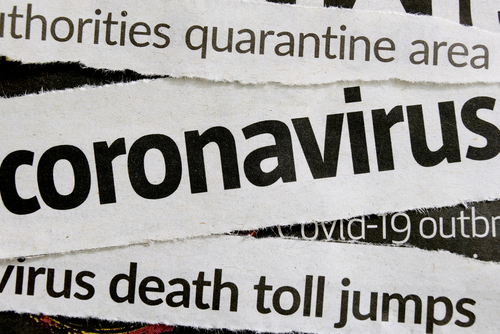- By now you’ve heard a lot of bad news about COVID-19, but things are already looking up.
- Today, Alexander Green shares some good news and talks about why wealth builders should focus on the positive.
You’ve already heard most of the bad news about the coronavirus.
It’s highly transmissible. No one is immune. The mortality rate is unsettling, especially for the elderly. There is no successful treatment or vaccine. We are woefully behind in testing. Cases are growing exponentially. And our healthcare system is not equipped to deal with it.
Most Americans have gotten the message and are staying at home or social distancing to “flatten the curve.”
But many are not.
We’ve all seen the footage of college students frolicking on Florida’s beaches. (And spring break isn’t famous for “no touching.”)
Of course, young people have always thought they were bulletproof, going back to the days before there were bullets.
While their immune systems are stronger, they are the biggest transmission risk in this pandemic.
Last night my wife showed me a social media post. A couple with small children were smiling and having a big time at a local restaurant.
“We have the whole place practically to ourselves,” they said. “Come out and join us you Fraidy Cats!”
(Ordinarily, I oppose shaming on social media. But in this case, I’m happy to make an exception.)
The sudden downturn in traveling, meeting, shopping and spending has put enormous pressure on the economy.
That, of course, is reflected in the stock market. And millions of investors are feeling the pain.
You should feel no particular shame or guilt about this, incidentally.
The coronavirus blindsided everyone, including the best and most seasoned investors.
(Warren Buffett’s Berkshire Hathaway, for example, is down 26% in the last four weeks.)
During this stressful period, however, take a moment to look at some positive developments.
Belatedly, yes, but Uncle Sam is taking historic steps.
The Federal Reserve has dropped short-term rates to zero and promised essentially unlimited liquidity to the credit markets.
Congress has set aside its partisan differences- – never a problem when it comes to spending billions of dollars of taxpayers’ money – and passed a coronavirus relief package.
President Trump has declared a national emergency.
In particular, the administration has issued a proclamation limiting immigration (but not goods or cargo), instructing the IRS to defer tax payments, assisting companies and workers harmed by the outbreak, and instructing the Small Business Administration to provide loans to small businesses that need them.
There is also talk about mailing immediate checks to consumers.
The markets, of course, want something even bigger, something bolder.
While new cases will continue to rise for several weeks, there is some good news in the war against the disease.
- China has closed down its last temporary hospital built to handle COVID-19. There are too few new cases to warrant them.
- A 103-year-old Chinese woman has made a full recovery from the disease after being treated for six days in Wuhan, becoming the oldest patient to beat COVID-19.
- Apple has already reopened all 42 of its retail stores in that country.
- After its peak of 909 new cases, South Korea saw a precipitous drop in the number of new cases reported daily.
- Dozens of laboratories and biotechs are working on experimental vaccines. One developed by Moderna (Nasdaq: MRNA) is already in the first stage of a clinical trial, with testing on 45 adults in Seattle.
- Doctors in India have successfully treated two Italian patients by administering a combination of drugs – principally ritonavir and lopinavir, with oseltamivir and chloroquine.
- Scientists at the Erasmus Medical Center claim to have found an antibody that can fight off infection by COVID-19.
- Plasma from newly recovered patients holds promise for treating others infected with the virus.
- Gilead Sciences (Nasdaq: GILD) is already in Phase 3 trials for its remdesivir treatment for COVID-19.
- Yesterday, closely held Ridgeback Biotherapeutics announced a promising oral treatment it is planning to move into human testing. (It is so confident that the firm is preparing to make 60 million doses.)
While there are no guarantees, we may get a fast-tracked medical solution to this pandemic quicker than most expect.
In the past two weeks, I have had numerous friends, relatives and subscribers reach out to me for a long list of stocks to “buy right now.”
I have refrained from doing so.
This virus will be with us for months and – with volatility extreme – we’ll have plenty of opportunities to put money to work in the weeks ahead.
To take advantage of a crisis, you don’t have to be the first one to the fire.
Also, you really should not keep cable news on all day, especially if you’re already anxious.
A five-minute update on the virus once or twice a day is plenty for most of us.
Nor is it a good idea to check the value of your investments several times daily, especially if you’re prone to acting impulsively.
This is a time to return to first principles.
If you have followed my advice and asset allocated properly (i.e., spread your risk outside the stock market), diversified broadly (i.e., hold stocks in several industries), bought quality (i.e., companies that will prosper on the other side of this crisis) and stuck to a sell discipline (e.g., trailing stops and/or rebalancing), you have done what a smart investor should do.
The key now is to be selective in your buying, take the long view and remain patient.
That was the right way to play every market panic of the last 200 years.
It’s the way to play this one too.
Good investing,
Alex
